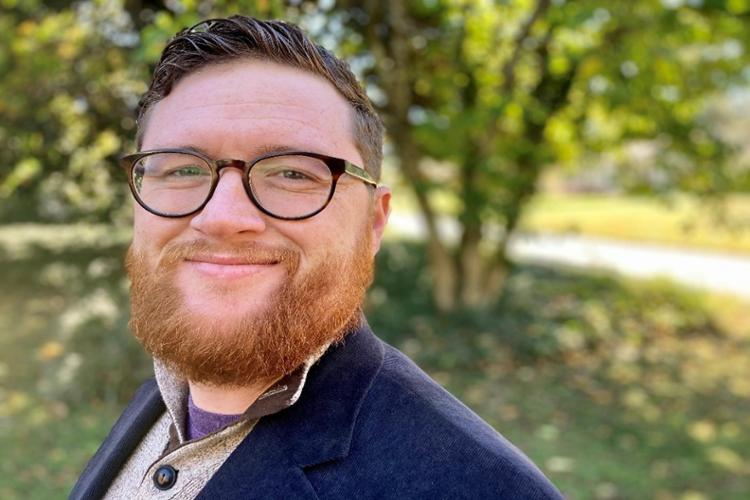Recent TIJS Graduate Highlight: Dr. Matthew Brittingham

In Spring 2023, Dr. Matthew H. Brittingham earned his PhD, granted with distinction, in Religion (Jewish Religious Cultures) from Emory University. His dissertation, entitled, "'No Heart for Faith': Depicting Freethinkers and Debating Freethought in the American Yiddish Press (1880s-1920s)," focused on how American Yiddish journalists wrote about freethought and freethinkers during the mass immigration period. A long-held vision, Brittingham first set his sights on completing a doctoral program and pursuing an academic career in high school.
Aiming toward a PhD, Brittingham’s higher education journey began at the University of Nebraska-Lincoln, where his passion for researching religion naturally presented itself. “I was originally thinking political science,” he reflects, “but got to undergrad and realized that wasn’t my thing, (though) I was still interested in what made people tick.” Following several semesters of pursuing courses that piqued his personal interest, Brittingham noticed a pattern: most of his classes carried a religion designation. “Wow!” he recalls thinking when the realization struck, “I almost have an undergraduate degree in this!” With faculty encouragement, Brittingham earned his BA – with a major in classics and religious studies and minors in Judaic Studies and philosophy – in 2012 before turning his attention to graduate school.
Bachelor’s degree in hand, Brittingham acted on faculty guidance to pursue a master’s degree at the Indiana University-Bloomington’s Borns Jewish Studies Program. Through the program’s language requirements, he discovered a passion for Yiddish before graduating in 2016 with highest honors after authoring the thesis, “Meir Kahane and the Holocaust: The Jewish Defense League as Collective Memory Project.” Finally, the opportunity to begin the long-sought PhD presented itself with Brittingham's enrollment at Emory, where he worked to further narrow the scope of his research.
At the program’s outset, determining which era to focus his research on proved challenging as Brittingham tried balancing different interests. “I originally came to Emory with the idea of doing something more modern, more ethnographic, more recent,” he recalls. “But while I was at Indiana I had started studying Yiddish, and quickly realized that I really had a passion for it. After working with different faculty, I found my path shifting a little bit, more toward the very early part of the twentieth century, late nineteenth century. You know, just kind of falling more and more in love with the period, with Yiddish literature, (and) with Jewish immigrants in the United States.”
As his focus started growing clearer, Brittingham formed a strong bond with Professor Eric Goldstein, who went on to become his faculty advisor. To that end, Goldstein served as a strong resource in aiding the path of Brittingham’s research as they began exploring religious themes, thinking about Orthodoxy, and the early creation of Orthodox institutions amongst Jewish immigrants. "Matthew’s work is path breaking in that he understands that Yiddish speaking immigrants were not easily divided into camps of ‘religious’ and ‘secular,’" Goldstein shares. "He shows that immigrants across the religious and political spectrum struggled with both religious tradition and secular ideas and sought to find some balance between them, even if they did not all resolve this tension in the same way. As a result, this dissertation gives us a much more nuanced and complex portrait of Jewish immigrant culture and thought than we’ve had before.”
Come 2018, Brittingham secured a translation fellowship with the Yiddish Book Center where he worked on a project called ‘The Freethinkers’ that solidified his next steps. “That’s where I really started to become interested in the study of secularism, secular identities, and what their relationship is to religion and to religious identities,” Brittingham explains. “That really intrigued me (to consider) what Jewish immigrants thought about free thinkers, free thought.” Ultimately, while exploring these questions in his dissertation, Brittingham elevated the quality of his work by leveraging his translation skills to include an array of primary Yiddish sources.
Dr. Miriam Udel, a member of Brittingham’s dissertation committee and Evans Director of the Tam Institute, emphasizes this further as she explains, “Matthew’s dissertation makes extraordinary contribution to our understanding of American Jewry during the period of peak immigration from Europe. His work troubles some of the ingrained, overly simple binaries that have dominated both scholarly and popular accounts of American Jewish immigrants and their cultural production: religious and freethinking, highbrow vs. lowbrow, socialist vs. reactionary, serious vs. frivolous, metropolitan vs. provincial, and spiritually vs. economically motivated. Matthew reads critically a large corpus of neglected texts in order to create a richer, more nuanced account of American Jews, their textual production and reception practices, and their religious lives during the ideologically perfervid early decades of the twentieth century.”
Looking to the future, Dr. Brittingham strives to find a balance between career and family. To that end, he has accepted a position close to home at Emory’s Oxford College - where he serves both as an academic advisor and instructor for an undergraduate Discovery Seminar on American Jewish History – as well as an online instructor role with the University of Missouri, Kansas City. Further down the road, Brittingham aspires to turn his dissertation into a book, conduct an in-depth study of the Yiddish journal Di Tsukunft, and publish his Yiddish translations.
Published 6/15/23